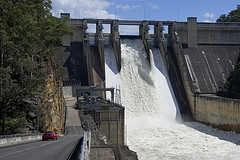
PIAC is concerned recently announced changes to the way water is priced for Sydney and Hunter region households do not encourage sustainable long-term water use and planning, and will leave households that use less water with higher water bills.
On Tuesday, the NSW Independent Pricing and Regulatory Authority (IPART) announced the introduction of new water pricing that reduces fixed charges, and introduces a ‘drought price’ that would see Sydney and Hunter Water customers pay more for water when dam levels drop below 60%.
PIAC welcomes IPART exploring better ways to price water so that the community has a sustainable and resilient water supply, but is concerned the chosen approach, while ensuring revenue in times of drought, is not the best outcome for Sydney and Hunter households.
PIAC supports moving charges from fixed to usage-based as it gives households more control of their bills and rewards efficient water use. However, it is concerned the new variable usage pricing will leave many households worse off.
‘Lowering fixed charges to encourage smarter water use is welcome,’ said Craig Memery, Head of Energy and Water Policy, Public Interest Advocacy Centre. ‘However, IPART’s ‘drought pricing’ requires people to response to a fluctuating, unpredictable price. This doesn’t give people any certainty to invest in water saving measures, and is particularly unfair for households who already use water efficiently. Drought pricing that is levied on all households means people who don’t have swimming pools and large gardens will, in the long run, foot the bill for those who do.’
The pricing shift will require changes to the support available to pensioners, whose rebates are tied to fixed charges, and increase prices for all usage, leaving renters and large family households facing higher bills and without access to rebates.
IPART rejected calls from PIAC and other NSW community organisations to use an Inclining Block Tariff (IBT) pricing structure. An IBT is used in most major cities in Australia and charges higher prices only for people who use a lot of water, while rewarding them for using less at all times, not just when there is a drought.
‘An Inclining Block Tariff sends a sustained signal to use water efficiently,’ said Mr Memery. ‘It keeps essential basic water use affordable for drinking, washing and cleaning, while making sure people who choose to water large gardens and fill swimming pools with tap water don’t pass on the cost to everyone. An inclining tariff is fairer for all, and better reflects the true cost of supplying water at all times.’
‘A short term drought price doesn’t help prevent water shortages,’ said Mr Memery. ‘As the climate changes and droughts become more frequent, we need to encourage water conservation at all times, not just when dams drop below 60%. This approach supports rationing when its too late, not early water conservation, and penalises people with the least ability to lower their usage.’
PIAC calls on IPART to initiate a comprehensive review of the framework for regulating water supply across NSW, including fairer and more sustainable pricing structures, and ensuring rebates and assistance measures support essential access to water.
MEDIA CONTACT: PIAC Energy and Water Communications Officer, Anna Livsey: 0478 739 280